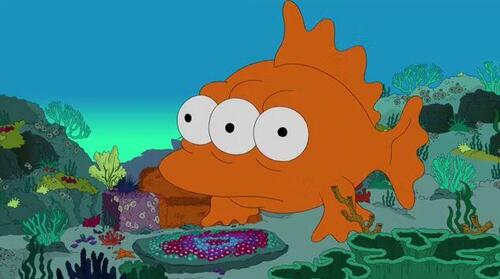
Authored by Zoey Sky via Natural News,
Japanese plant operator Tokyo Electric Power Company (TEPCO) studied a black rockfish in May and found that it contained levels of radioactive cesium that were 180 times over Japan's regulatory limit.
The radioactive fish was caught near drainage outlets at the TEPCO plant, where three nuclear reactors melted down amidst a tsunami in March 2011. Rainwater from areas near the reactors flows into the area where the fish was caught.
The alarming discovery reignited concerns over TEPCO's plans to start releasing 1.3 million tons of treated wastewater from the former Fukushima Daiichi nuclear power plant by August.
A report from July 23 showed that the problem is still unaddressed, prompting questions about how dangerous the company's plans are for the public.
Radioactive cesium health risks
Radioactive cesium has been detected in surface water and different kinds of food, such as breast milk and pasteurized milk. The amount of radioactive cesium in food and milk depends on several factors.
The most important factor is whether or not there has been a recent fallout from a nuclear explosion, like a weapons test or an accident at a nuclear power plant.
Depending on one's level of exposure, cesium can cause diarrhea, bleeding, nausea, vomiting, coma and death.
TEPCO wastewater has been mixed with rainwater and groundwater since the tsunami. The company admitted that fish near the drainage outlets are unsafe for consumption because the concentration of cesium in seabed sediment in the area has measured more than 100,000 becquerels per kilogram (Bq/kg). The maximum legal level is only 100 Bq/kg.
A TEPCO official explained that the company has regularly removed fish from inside the port since 2012 because contaminated water flowed into the Fukushima Daiichi nuclear power station port immediately after the accident.
In January 2022, a fish caught near Fukushima was found to have high levels of radiation. Authorities said that the fish had escaped from the drainage outlet.
Following the report, shipments of black rockfish caught off the coast of Fukushima prefecture were immediately suspended. As of writing, they have not been resumed.
More than 40 fish with cesium levels over the legal limit were caught in TEPCO's port between May 2022 and May 2023. At least 90 percent of the fish were from the inner breakwater, where water flows from the area surrounding the melted TEPCO reactors.
Wastewater release approved despite potential radiological impact
The Nuclear Regulation Authority (NRA) in Japan and the United Nations' International Atomic Energy Agency (IAEA) have both approved TEPCO's plan to release wastewater into the Pacific Ocean. The company claims the move is necessary to "secure space for decommissioning the plant." (Related: Japan gets green light to release Fukushima radioactive water into Pacific Ocean.)
However, the process would take decades to complete using an Advanced Liquid Processing System (ALPS). Earlier in July, the IAEA said the plan would have a "negligible radiological impact" on people and the environment.
Paul Dorfman from Ireland’s Radiological Protection Advisory Committee warned that reports like the one about the contaminated rockfish are likely far from over.
Companies believing and pretending certain things are not harmful because it is convenient is "literally killing the planet," said Celine-Marie Pascale, an American University sociologist. She added that most of the time, corporate interests "triumph at global expense."
Meanwhile, officials in Hong Kong have declared that they will ban food imports from 10 prefectures in Japan if the release moves forward in August. Some Chinese wholesalers have already stopped accepting seafood imports from Japan.
Aside from concerns about cesium, TEPCO has admitted that ALPS, which it plans to use, may not be enough to eliminate isotopes such as cobalt, plutonium, ruthenium and strontium. The system is also unable to remove tritium, the radioactive isotope of hydrogen.
In June, Masanobu Sakamoto, president of JF Zengyoren, Japan Fisheries Cooperatives, said the group does not support the Japanese government's stance that "an ocean release is the only solution."
Watch the video below for the IEAA's report on the allegedly safe Fukushima water release.
Authored by Zoey Sky via Natural News,
Japanese plant operator Tokyo Electric Power Company (TEPCO) studied a black rockfish in May and found that it contained levels of radioactive cesium that were 180 times over Japan’s regulatory limit.
The radioactive fish was caught near drainage outlets at the TEPCO plant, where three nuclear reactors melted down amidst a tsunami in March 2011. Rainwater from areas near the reactors flows into the area where the fish was caught.
The alarming discovery reignited concerns over TEPCO’s plans to start releasing 1.3 million tons of treated wastewater from the former Fukushima Daiichi nuclear power plant by August.
A report from July 23 showed that the problem is still unaddressed, prompting questions about how dangerous the company’s plans are for the public.
Radioactive cesium health risks
Radioactive cesium has been detected in surface water and different kinds of food, such as breast milk and pasteurized milk. The amount of radioactive cesium in food and milk depends on several factors.
The most important factor is whether or not there has been a recent fallout from a nuclear explosion, like a weapons test or an accident at a nuclear power plant.
Depending on one’s level of exposure, cesium can cause diarrhea, bleeding, nausea, vomiting, coma and death.
TEPCO wastewater has been mixed with rainwater and groundwater since the tsunami. The company admitted that fish near the drainage outlets are unsafe for consumption because the concentration of cesium in seabed sediment in the area has measured more than 100,000 becquerels per kilogram (Bq/kg). The maximum legal level is only 100 Bq/kg.
A TEPCO official explained that the company has regularly removed fish from inside the port since 2012 because contaminated water flowed into the Fukushima Daiichi nuclear power station port immediately after the accident.
In January 2022, a fish caught near Fukushima was found to have high levels of radiation. Authorities said that the fish had escaped from the drainage outlet.
Following the report, shipments of black rockfish caught off the coast of Fukushima prefecture were immediately suspended. As of writing, they have not been resumed.
More than 40 fish with cesium levels over the legal limit were caught in TEPCO’s port between May 2022 and May 2023. At least 90 percent of the fish were from the inner breakwater, where water flows from the area surrounding the melted TEPCO reactors.
Wastewater release approved despite potential radiological impact
The Nuclear Regulation Authority (NRA) in Japan and the United Nations’ International Atomic Energy Agency (IAEA) have both approved TEPCO’s plan to release wastewater into the Pacific Ocean. The company claims the move is necessary to “secure space for decommissioning the plant.” (Related: Japan gets green light to release Fukushima radioactive water into Pacific Ocean.)
However, the process would take decades to complete using an Advanced Liquid Processing System (ALPS). Earlier in July, the IAEA said the plan would have a “negligible radiological impact” on people and the environment.
Paul Dorfman from Ireland’s Radiological Protection Advisory Committee warned that reports like the one about the contaminated rockfish are likely far from over.
Companies believing and pretending certain things are not harmful because it is convenient is “literally killing the planet,” said Celine-Marie Pascale, an American University sociologist. She added that most of the time, corporate interests “triumph at global expense.”
Meanwhile, officials in Hong Kong have declared that they will ban food imports from 10 prefectures in Japan if the release moves forward in August. Some Chinese wholesalers have already stopped accepting seafood imports from Japan.
Aside from concerns about cesium, TEPCO has admitted that ALPS, which it plans to use, may not be enough to eliminate isotopes such as cobalt, plutonium, ruthenium and strontium. The system is also unable to remove tritium, the radioactive isotope of hydrogen.
In June, Masanobu Sakamoto, president of JF Zengyoren, Japan Fisheries Cooperatives, said the group does not support the Japanese government’s stance that “an ocean release is the only solution.”
Watch the video below for the IEAA’s report on the allegedly safe Fukushima water release.
Loading…





